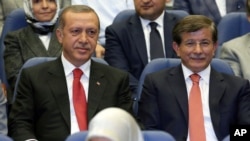Turkey’s ruling AK Party has chosen Foreign Minister Ahmet Davutoglu as the successor to Prime Minister Recep Tayyip Erdogan - who is now the president-elect.
The central committee of Turkey’s ruling AK Party named Foreign Minister Davutoglu as the new prime minister, a move that will take effect later in the month. The choice was widely predicted.
Announcing the decision to senior members of the party and media, Erdogan said he consulted widely before making a decision.
"What is expected of the new prime minister is to realize our dream of the new Turkey," he said, adding that Ahmet Davutoglu’s hard work and ambition influenced the decision, reached on merit. He said Davutoglu "is committed to a foreign policy with a conscience and our belief is he will continue this commitment as prime minister," said Erdogan.
Davutoglu promised he would continue the work of Erdogan.
"I will continue this restoration movement started 12 years ago when Turkey was seen as the sick man of Europe," he said. "Our celebrated journey will reach its target. The AK Party will stand as a monumental rock against its adversaries. The AK Party struggle for rights and democracy is not limited by years or centuries."
Analysts describe the 55-year-old Davutoglu as a close and loyal ally of Erdogan. He stood firmly by the prime minister during last December’s police investigations into high level government graft, which implicated Erdogan’s family.
Davutoglu joined the AK Party in 2003 as Erdogan’s chief foreign policy adviser. He comes from an academic background and speaks three languages. In 2009, he became foreign minister and is widely credited with being behind Turkey's adoption of a more Middle East-oriented foreign policy, what has been dubbed by some as “neo-Ottomanism.”
Analysts say part of that policy is backing the Muslim Brotherhood across the region, and strongly supporting Syrian rebels fighting the Damascus regime. The policy has proven controversial, with Turkey having broken or strained diplomatic relations with all of its southern neighbors.
Soli Ozel, political columnist of the Turkish newspaper Haberturk, says Davutoglu has a low standing within the party, but that suits Erdogan’s ambitions as president.
"I suspect Davutoglu will be a weak prime minister because although he has invested heavily [in] domestic politics lately, he is still not a very well-rooted domestic politician. This is precisely what Erdogan wants, the president-elect. He wants a prime minister who cannot really challenge him, and in Davutoglu he has that person," said Ozel.
Erdogan has declared he will take a far more active political role as president than usual. Under Turkey's constitution, the presidency is a broadly ceremonial position with parliament having the real power.
Davutoglu is expected to be elected head of the ruling AK Party at a party congress scheduled for next week. He will then take over the prime minister’s office after Erdogan ascends to the presidency on August 28.










